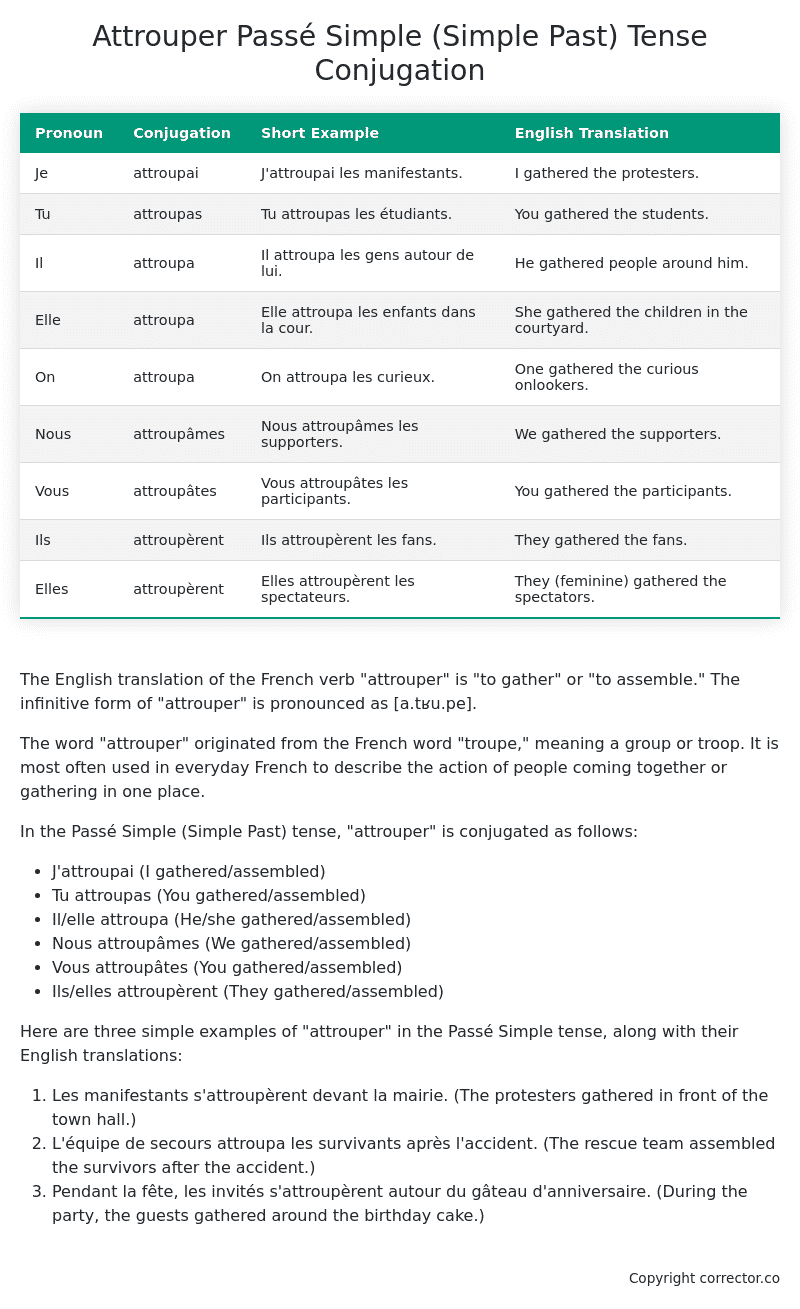Passé Simple (Simple Past) Tense Conjugation of the French Verb attrouper
Introduction to the verb attrouper
The English translation of the French verb “attrouper” is “to gather” or “to assemble.” The infinitive form of “attrouper” is pronounced as [a.tʁu.pe].
The word “attrouper” originated from the French word “troupe,” meaning a group or troop. It is most often used in everyday French to describe the action of people coming together or gathering in one place.
In the Passé Simple (Simple Past) tense, “attrouper” is conjugated as follows:
- J’attroupai (I gathered/assembled)
- Tu attroupas (You gathered/assembled)
- Il/elle attroupa (He/she gathered/assembled)
- Nous attroupâmes (We gathered/assembled)
- Vous attroupâtes (You gathered/assembled)
- Ils/elles attroupèrent (They gathered/assembled)
Here are three simple examples of “attrouper” in the Passé Simple tense, along with their English translations:
- Les manifestants s’attroupèrent devant la mairie. (The protesters gathered in front of the town hall.)
- L’équipe de secours attroupa les survivants après l’accident. (The rescue team assembled the survivors after the accident.)
- Pendant la fête, les invités s’attroupèrent autour du gâteau d’anniversaire. (During the party, the guests gathered around the birthday cake.)
Table of the Passé Simple (Simple Past) Tense Conjugation of attrouper
| Pronoun | Conjugation | Short Example | English Translation |
|---|---|---|---|
| Je | attroupai | J’attroupai les manifestants. | I gathered the protesters. |
| Tu | attroupas | Tu attroupas les étudiants. | You gathered the students. |
| Il | attroupa | Il attroupa les gens autour de lui. | He gathered people around him. |
| Elle | attroupa | Elle attroupa les enfants dans la cour. | She gathered the children in the courtyard. |
| On | attroupa | On attroupa les curieux. | One gathered the curious onlookers. |
| Nous | attroupâmes | Nous attroupâmes les supporters. | We gathered the supporters. |
| Vous | attroupâtes | Vous attroupâtes les participants. | You gathered the participants. |
| Ils | attroupèrent | Ils attroupèrent les fans. | They gathered the fans. |
| Elles | attroupèrent | Elles attroupèrent les spectateurs. | They (feminine) gathered the spectators. |
Other Conjugations for Attrouper.
Le Present (Present Tense) Conjugation of the French Verb attrouper
Imparfait (Imperfect) Tense Conjugation of the French Verb attrouper
Passé Simple (Simple Past) Tense Conjugation of the French Verb attrouper (You’re reading it right now!)
Passé Composé (Present Perfect) Tense Conjugation of the French Verb attrouper
Futur Simple (Simple Future) Tense Conjugation of the French Verb attrouper
Futur Proche (Near Future) Tense Conjugation of the French Verb attrouper
Plus-que-parfait (Pluperfect) Tense Conjugation of the French Verb attrouper
Passé Antérieur (Past Anterior) Tense Conjugation of the French Verb attrouper
Futur Antérieur (Future Anterior) Tense Conjugation of the French Verb attrouper
Subjonctif Présent (Subjunctive Present) Tense Conjugation of the French Verb attrouper
Subjonctif Passé (Subjunctive Past) Tense Conjugation of the French Verb attrouper
Subjonctif Imparfait (Subjunctive Imperfect) Tense Conjugation of the French Verb attrouper
Subjonctif Plus-que-parfait (Subjunctive Pluperfect) Tense Conjugation of the French Verb attrouper
Conditionnel Présent (Conditional Present) Tense Conjugation of the French Verb attrouper
Conditionnel Passé (Conditional Past) Tense Conjugation of the French Verb attrouper
Conditionnel Passé II (Conditional Past II) Tense Conjugation of the French Verb attrouper
L’impératif Présent (Imperative Present) Tense Conjugation of the French Verb attrouper
L’impératif Passé (Imperative Past) Tense Conjugation of the French Verb attrouper
L’infinitif Présent (Infinitive Present) Tense Conjugation of the French Verb attrouper
L’infinitif Passé (Infinitive Past) Tense Conjugation of the French Verb attrouper
Le Participe Présent (Present Participle) Tense Conjugation of the French Verb attrouper
Le Participe Passé (Past Participle) Tense Conjugation of the French Verb attrouper
Struggling with French verbs or the language in general? Why not use our free French Grammar Checker – no registration required!
Get a FREE Download Study Sheet of this Conjugation 🔥
Simply right click the image below, click “save image” and get your free reference for the attrouper Passé Simple tense conjugation!

Attrouper – About the French Passé Simple (Simple Past) Tense
Formation
Usage
Narration
Historical Context
Interactions with other tenses
Passé Composé
Imparfait
Conditional and Subjunctive
Summary
I hope you enjoyed this article on the verb attrouper. Still in a learning mood? Check out another TOTALLY random French verb conjugation!


